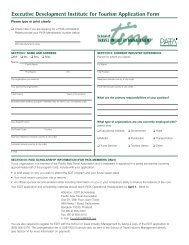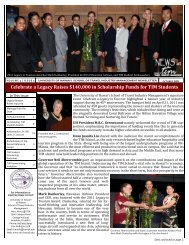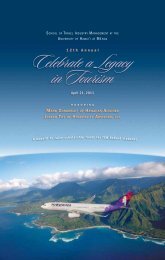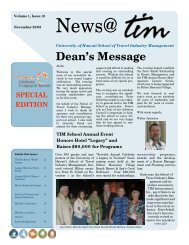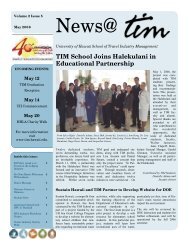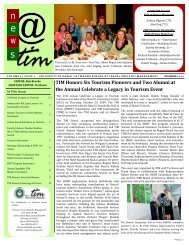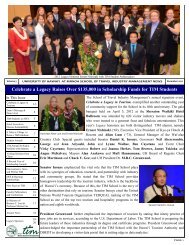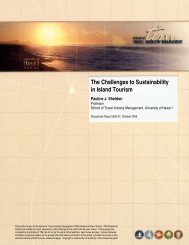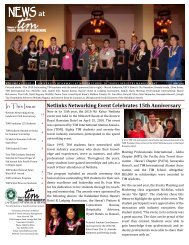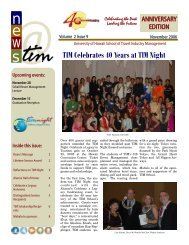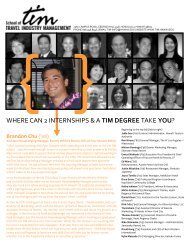TO490_glossary - School of Travel Industry Management
TO490_glossary - School of Travel Industry Management
TO490_glossary - School of Travel Industry Management
Create successful ePaper yourself
Turn your PDF publications into a flip-book with our unique Google optimized e-Paper software.
GLOSSARY<br />
*Denotes definitions adapted from Charles R. Goeldner & J.R. Brent Ritchie, Tourism: Principles,<br />
Practices, Philosophies, 10 th ed. (Hoboken, NJ: John Wiley & Sons, Inc.)<br />
A<br />
*Accommodation- Facilities for the lodging <strong>of</strong> visitors to a destination. The most common forms<br />
are hotels, motels, campgrounds, bed and breakfast (B&B), dormitories, hostels, and the homes <strong>of</strong><br />
friends and relatives.<br />
Adventure and Outdoor Recreation- An emerging tourism sector. Due to changing demand and<br />
characteristics <strong>of</strong> the visitors, there is a higher demand for activities linked to nature (Ecotourism)<br />
and sport activities.<br />
Adventure <strong>Travel</strong>- A form <strong>of</strong> travel in which the perception (and <strong>of</strong>ten the reality) <strong>of</strong> heightened<br />
risk creates a special appeal to certain segments <strong>of</strong> the travel market. Examples include white-water<br />
rafting and mountaineering.<br />
*Attractions- Facilities developed especially to provide residents and visitors with entertainment,<br />
activity, learning, socializing, and other forms <strong>of</strong> stimulation that make a region or destination a<br />
desirable and enjoyable place.<br />
C<br />
*Carrying capacity- The amount <strong>of</strong> tourism a destination can handle.<br />
Competitive Destination- A destination that is able to effectively compete against similar locales to<br />
attract tourists.<br />
Convention and Visitors Bureau- (Destination <strong>Management</strong> Organizations, or DMO’s).<br />
Government funded bureaus that focus on the marketing, management, and research for convention<br />
centers and local tourism industry.<br />
Cultural Tourism- Covers all aspects <strong>of</strong> travel whereby people learn about each other’s way <strong>of</strong> life<br />
and thought.<br />
D<br />
Destination Attributes- Key characteristics <strong>of</strong> a destination that separates itself from their<br />
competition.<br />
Destination Positioning- Marketing to enhance a destination’s attractiveness to potential tourists.<br />
Direct Impact- The effect <strong>of</strong> tourism expenditures in an area. Positive impacts include optimizing<br />
for the local economy, balance <strong>of</strong> payments, investment stimulation, tax revenue from tourism and<br />
TO 490, Glossary, page 1
etc. Negative impacts could also take place. These include: inflationary pressure, tension between<br />
locals and tourists, pollution, increase traffic, etc.<br />
Domestic Tourism- Visits by residents <strong>of</strong> a country to their own country.<br />
E<br />
*Events- Includes a broad range <strong>of</strong> “occurrences,” happenings,” and “activities” that are designed<br />
around various themes, with a view to creating or enhancing interest in the destination. Local<br />
festivals and mega-events (such as the Olympic Games and world expositions) have prove to be the<br />
most effective.<br />
Expenditures- Sum total <strong>of</strong> money spent within the borders <strong>of</strong> a nation or a political subdivision or a<br />
transportation-centered economic area <strong>of</strong> contiguous states or nations.<br />
H<br />
Heritage Interpretation- Useful to tourism for its academic approach through informing people <strong>of</strong> a<br />
locale’s history, people, culture etc. Courses can be developed to enable locals to become authentic<br />
interpreters <strong>of</strong> their area’s cultural, historical, and natural heritage.<br />
Host Community- Local people. Host community’s role in tourism is their interaction with tourists.<br />
The interaction between tourists and host community can be beneficial, harmful or both.<br />
I<br />
*Incentive Tour- A tour arranged especially for employees or agents <strong>of</strong> a company as a reward for<br />
achievement, usually sales. Spouses are typically included on the trip.<br />
*Infrastructure- The facilities, equipment, and installations needed for the basic functioning and<br />
daily lives <strong>of</strong> the residents <strong>of</strong> a region. These include communication systems, water and sewage<br />
facilities, public protection, health, transportation, and the education systems.<br />
International Tourism- Comprised <strong>of</strong> two parts. A) Inbound tourism- Visits to a country by nonresidents.<br />
B) Outbound tourism- Visits by residents <strong>of</strong> a country to another country.<br />
L<br />
Leakage- Combination <strong>of</strong> savings and imports. The more tourism expenditures is circulated within<br />
and maintained in the local economy, there is less leakage.<br />
Lodging <strong>Industry</strong>- Tourism sector that provides sleeping facilities for visitors. There is a large<br />
variety <strong>of</strong> lodging options for tourists at the destination. Theses include: hotels, motels, bed &<br />
breakfasts (B&B), pensions, timeshares, and campgrounds.<br />
TO 490, Glossary, page 2
M<br />
Meeting and Conventions- A new trend in tourism where visitors come from different areas and<br />
converge on a destination to attend a meeting. International participants <strong>of</strong> conventions and meeting<br />
tend to spend more per day during their visit.<br />
O<br />
Operating Sectors- Various components <strong>of</strong> the tourism industry. These include: transportation,<br />
accommodation, food services, attractions, events, adventure and outdoor recreation, entertainment,<br />
trade sector and tourism services.<br />
S<br />
*Supplier- An industry term meaning any form <strong>of</strong> transportation, accommodations, and other travel<br />
services used by a travel agency or tour operator to fulfill the needs <strong>of</strong> travelers.<br />
Sustainable destinations- The ability <strong>of</strong> a destination to preserve its physical, social, cultural and<br />
environmental resources while it compete in the marketplace.<br />
T<br />
*Timeshare- Concept <strong>of</strong> dividing the ownership and use <strong>of</strong> a lodging property among investors. For<br />
example, for $50,000, you can own a hotel unit for one week <strong>of</strong> the year for the rest <strong>of</strong> your life.<br />
*Tourism-(1)- The entire world industry <strong>of</strong> travel, hotels, transportation, and all other components,<br />
including promotion, that serves the needs and wants <strong>of</strong> travelers. Tourism today has been given<br />
new meaning and is primarily a term <strong>of</strong> economics referring to an industry. (2)- Within a nation<br />
(political subdivision or transportation-centered economic area <strong>of</strong> contiguous nations), the sum total<br />
<strong>of</strong> tourist expenditures within their borders is referred to as the nation’s tourism or tourist industry<br />
and is thus ranked with other national industries. More important than just the total monetary<br />
product value <strong>of</strong> tourism is its role in the balance <strong>of</strong> trade. Here tourism earnings from foreigners<br />
truly represent an export industry. Tourism is an “invisible” export.<br />
Tourist Offices and Information Centers- Entities funded by government or local chambers <strong>of</strong><br />
commerce to provide visiting and potential tourists information about the destination.<br />
TO 490, Glossary, page 3



